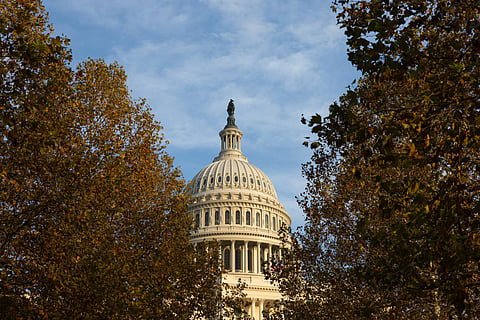End to US government shutdown in sight as Democrats quarrel
The Senate voted 60-40 to consider a compromise bill to fund the government.

The longest US government shutdown appeared headed for an end Monday, after a small group of Senate Democrats broke a 40-day stalemate and joined Republicans in advancing a compromise deal—sparking backlash within their party.
House urged to return immediately
Speaker Mike Johnson said Monday that House lawmakers should start returning to Washington "right now" following the Senate breakthrough late Sunday. The Senate voted 60-40 to consider a compromise bill to fund the government.
"It appears our long national nightmare is finally coming to an end," Johnson said, adding: "We have to do this as quickly as possible." The House has been out of session since mid-September.
Shutdown impacts millions
Since October 1, over a million federal workers have been unpaid, while government benefits and services have been disrupted. Air travel has been heavily affected, with hundreds of daily flight cancellations, increasing pressure to resolve the impasse.
Moderate Democrats break ranks
A small group of moderate Senate Democrats—including Jeanne Shaheen, Maggie Hassan, Angus King, Tim Kaine, Dick Durbin, John Fetterman, Catherine Cortez Masto, and Jacky Rosen—voted with Republicans to advance three bipartisan spending bills and extend government funding until late January.
The move reverses many Trump-era federal worker firings and ensures they are paid once the shutdown ends. Only five Democrats switched their votes—the exact number needed for the deal to move forward.
Obamacare subsidies remain unresolved
The deal does not guarantee an extension of health care subsidies under the Affordable Care Act, angering many Democrats. Senate Majority Leader John Thune promised a mid-December vote on the subsidies, though success is not assured.
"After 40 days of uncertainty, I'm profoundly glad to announce that nutrition programs, our veterans, and other critical priorities will have full-year funding," Thune said.
Senator Chuck Schumer, along with most Democrats, opposed the measure, warning: "We will not give up the fight" and calling the vote a failure to address the health care crisis. Independent Senator Bernie Sanders called it a "horrific mistake."
House Democrats divided
House Democrats quickly criticised the Senate, with progressive leaders such as Greg Casar calling the deal a "betrayal" of millions counting on them to fight for lower health care costs. Others, like House Democratic leader Hakeem Jeffries, expressed support for Schumer’s leadership despite disagreements.
Legislative hurdles remain
Final passage could still take days if senators object. Some Republicans have raised concerns over specific provisions, including Kentucky Senator Rand Paul’s opposition to a hemp-related clause. Thune remains confident the bill can pass within hours, not days.
President Trump has not confirmed whether he will sign the legislation but said Sunday evening that it "looks like we're getting close to the shutdown ending."
Health care debate looms
The two parties remain at odds over ACA tax credits. While some Republicans are open to extending subsidies, they also want new eligibility limits. Trump and other Republicans continue to criticise the law and call for major reforms. House Speaker Mike Johnson did not commit to voting on the subsidies in the House.







